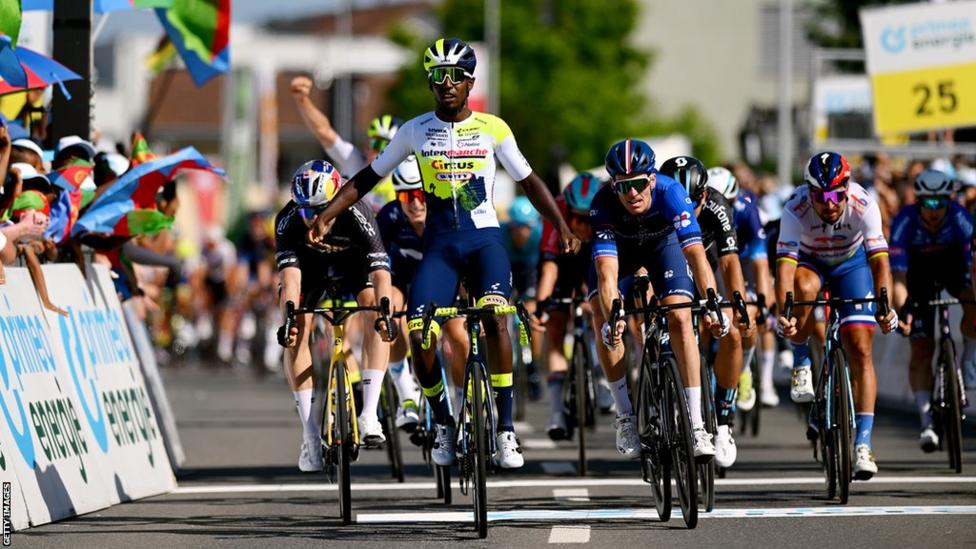Eritrean Biniam Girmay can bring cycling to “every single country in Africa”, according to his former coach Jean-Jacques Henry.
At the Giro d’Italia last year, the 23-year-old became the first black African to win a Grand Tour stage and in June he won the second stage of the Tour de Suisse.
International Cycling Union’s (UCI) Jean-Jacques Henry was Girmay’s first coach in Europe and believes more success awaits at the Tour de France which gets under way on 1 July in Bilbao.
“The general classification, I don’t think he can (win) but he has a chance to win a stage,” Henry told BBC World Service.
“The Tour de France will be an even bigger event and he’ll bring (a win) to every single country in Africa.
“He is already very popular everywhere in Africa. All the people who love cycling will watch the tour and, if he wins, I think all Africans people will be proud.”
Giro d’Italia to Tour de France
Girmay, racing for Team Intermarche, beat Dutchman Mathieu van der Poel in a sprint for the line to win stage 10 of the Giro d’Italia – the victory providing an iconic image.
The fact it was his debut year on the Grand Tour increased the magnitude of the achievement.
Binay Girmay: Africa’s new cycling hero – Podcast
Giro d’Italia: Biniam Girmay celebrates as first black African stage winner
Indeed foreshadowing the moment, Girmay said that winning a tour stage would be one of cycling’s “best moments”.
“I think he’s opening a lot of people’s eyes,” Maude le Roux, 26, told the BBC. The South African along with Ethiopian, Selam Amha Gerefiel, is part of the UCI’s World Cycling Centre (WCC) team in Aigle, Switzerland, where Girmay first rode in Europe.
“There are cyclists in Africa that need help to come to Europe. Cycling is not just a European sport and, being a rider from Africa, it’s hard to come into Europe.
“Binyam is shedding some light on that. The teams are starting to look for riders in Africa, which is amazing.
“Just the fact that he was on this team, obviously now we have a woman’s team, but that he was in the centre – I think I speak for me and Salaam saying that gives us hope for the future that we can make it and we’re here for a reason.”
Gerefiel, 26, added: “He’s a teacher for us so I’m looking to be better and work hard like him. For me he is a model.”
Biniam Girmay (centre) wins a stage of the Giro de Italia
Girmay became the first black African to win a stage of the Grand Tour when he claimed victory at the Giro de Italia in 2022
Cycling’s World Championships will be held in Africa for the first time in 2025 in Kigali, Rwanda.
Both the east African event in two years and Giray’s prominence mark the rise of the sport on the continent.
“Cycling is Eritrea’s number one sport,” Henry continued. “They have the same potential as Kenyans who are champions in athletics.
“If you transfer this potential – endurance potential on the bicycle – they can be the best in the world.”
So what of the man that Henry coached who would go on to put Eritea and African cycling on the map.
Would he feel the weight of a continent on his shoulders?
“When he was with us he was not stressed at all – quite shy – but the good thing is that he was happy with everybody. Just enjoying life – smiling all the time to everybody,” Henry said.
“This is something very important for high level athletes just to enjoy life and without any stress.
“Many riders are stressed by the results, by not having the right performance at the right moment – not achieving the goals. But for him – he didn’t have that kind of choice.”
Pastries and cobblestones
Among the choices that Girmay did have related to adapting to life in Europe and the new training regimes.
“He was a junior in 2018 when he came here for the first time,” Henry said. “We had him in July, August and September, to prepare for the World Championship in Innsbruck. It was too cold for him. It was 4 July – it was warm – but it was too cold for him.
“So it was quite tough to prepare him because we had to change a lot of things, his lifestyle, his routines. You can eat just vegetables or pastries and ‘OK, it’s good’ but you need to have a great balance between these kinds of foods with some carbohydrates or with some proteins.”
The next challenge for Girmay was the surfaces in Europe, something he would eventually overcome when wining the 78th edition of the Gent-Wevelgem one-day classic on the famous cobbled streets of Belgium.
“He didn’t like the cobblestones,” said Henry. “He always told us: ‘I don’t like that. I don’t want to race on cobblestones.’ Now he can win those races in the world tour.
“Now he has changed his mind. he enjoyed it. To win these kinds of races, you have to enjoy those cobblestone sections.”
Girmay claimed the second stage of June’s Tour de Suisse – this after recovering from a horror crash at the Tour of Flanders which wiped out most of the peloton.
Henry still keeps a close eye on his protege, who he says is a “special rider and sprinter” but is “not a pure climber, he will not be so efficient in big mountains”.
Beyond the rider, however, Henry believes Girmay’s impact on the sport is only just at the start line.
“After his career he can be someone who can help to develop cycling in Africa and in Eritrea, and give his experience.
“He can turn into a symbol, as African athletes can succeed in Europe and in the best races in the world.”
